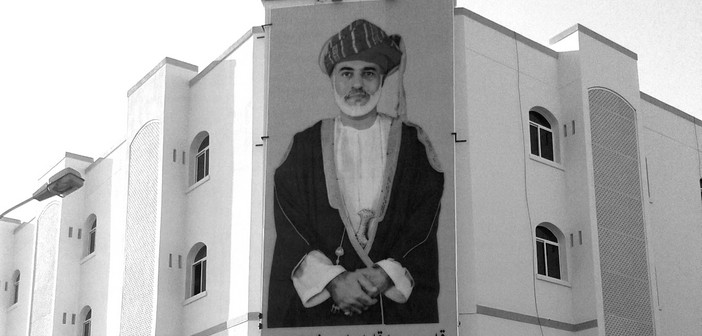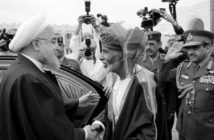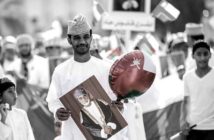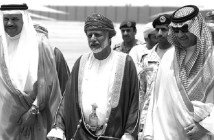Oman’s Sultan Qaboos is undeniably the political heart of this strategically vital Gulf state, perhaps more so than any other political leader is to their country in the world. While constitutional reforms in 2011 granted more powers to the country’s legislature, Qaboos remains ultimately responsible for guiding the nation’s political institutions. While his seven month absence from the country for medical treatment in Germany has generated anxiety about what the future holds for the sultanate, it has also provided an interesting insight into the capacity of the state to operate without its chief architect and driver.
In November 2014 Sultan Qaboos made a brief television appearance from Germany to address the Omani nation, confirming his ongoing medical treatment and his intention to return as soon as possible. Since then there has been little solid information about his status or when he will return. In recent weeks however, rumours began to swirl of Qaboos’ imminent return and preparations for ceremonies and celebrations were hastily ordered at some public institutions. Across the country both Omani nationals and expatriates continue to wait expectantly, with no one really knowing what will be the reaction to the Sultan’s eventual return and what it will mean; whether he will be returning with a clean bill of health or to a final resting place in the embrace of his people. Official information is unavailable, however, reports suggest that he is recovered and will return to Oman in March, possibly via the United Kingdom. It is certain that his return will be a historic moment for this young state, which is nonetheless steeped in culture and tradition, and will be the first of many key moments in the coming period.
Sultan Qaboos has been at the vanguard of the nation’s rapid entry into the ‘modern’ world and the speed of the country’s transformation has been breathtaking. For an outsider it is difficult to comprehend the bewilderment of some older Omanis to the change. Even Omanis in their 30s attended school beneath trees or in tents in their home villages. The paradox of Oman is that (with the exception of drivers on Sultan Qaboos Street) nothing ever seems to move quickly. It would seem that the calm, cautious and unflappable temperament of Omani people is well attuned to cope with change and an uncertain future. This sense of composure has been evident during the Sultan’s absence. The country has continued to operate smoothly at political, social and economic levels. Even when the global oil price dropped alarmingly in late 2014, calm prevailed amongst Omani people – in contrast to the reaction of many expatriates and outside observers.
The IMF arrived in Muscat in early March 2015 to explain to Oman’s elected Majlis al-Shura members that they should be panicking about their financial predicament. According to the IMF’s experts –steeped in neoliberal ideology– Oman would be spending more than it earned by the year’s end and there was an urgent need to accelerate economic diversification, enforce public sector efficiencies and create the correct incentives to stimulate the private sector. In typical Omani style, the Majlis members informed the IMF delegation of “the importance of taking into account local data in planning and implementing projects as every country has its conditions and indicators”. In other words, ‘according to our own numbers we have it under control, don’t panic’. Oman has access to alternative funds, including significant reserves and funding from GCC partners anxious to assist fellow monarchies against economic instability, including a $US20 billion package offered to Oman and Bahrain in 2011.
Oman is anxious, however, to avoid becoming overly indebted to its GCC neighbours and is actively looking for ways to ensure its economic future and political independence. To this end the state is investing heavily in encouraging Omani nationals into establishing a footing in the private sector through small and medium enterprises. Highly favourable loans are available to Omanis who fit certain criteria and have a good business idea. Time will see if the ‘invisible hand’ of the market can be deliberately placed by the Omani state on the heads of the Omani people who have come to rely heavily on public sector security. The political costs of shutting off the public sector tap too quickly could be perilous, especially considering the potential for unemployment and inequality to lead to frustration among the country’s young population.
To their merit most Omanis understand the strategies being employed by the government and the accompanying policy of ‘Omanization’ , which is designed to ensure the privatisation process does not play out to the benefit of foreigners. Many are very aware of the opportunities and have a foot on both sides, retaining their government jobs while they work on private commercial interests. As business picks up many are now quitting their day jobs. Many difficult readjustments remain necessary in the country’s political economy, including the unaffordable energy subsidies on fuel and electricity. There could be a case for pushing these adjustments ahead in the shorter term, in order to avoid handing the eventual successor a dangerous ‘hospital pass’, to use a rugby union phrase.
Much of the hard work has been done. The country is seen as a stable, potentially lucrative place for foreign investment. The world’s top brands are flooding the newly constructed malls and commercial districts. If there was genuine concern about Oman’s future beyond Sultan Qaboos it has not reduced international and domestic appetites to surge ahead with development plans – including state of the art new airports in Muscat and in regional capitals. Rather than trying to compete with the glitz of Dubai and Abu Dhabi in these developments Oman is banking on its main resource – its people and culture – to provide the best customer service in the world. For anyone who has experienced the down-to-earth hospitality of Omani people they will understand the clear comparative advantage that exists in this strategy, especially in regard to tourism.
The brief flirtation with banning alcohol in the country seems to have been put on the backburner after being tabled by the parliament’s elected lower house. Potentially harmful effects on tourism and foreign investments were raised in some quarters. In unofficial surveys conducted by local newspapers, public opinion seemed overwhelmingly in favour of the ban, however, this should not be read by observers as a sign of rising religious conservatism, and is equally based on addressing the social costs in terms of health and road accidents caused by alcohol consumption. It should be remembered that alcohol has none of the social norms attached to it here as it does in the West, and is considered in similar terms to any other addictive drug by most people. It seems also that the greatest opposition to banning alcohol comes from females, who see only the negative effects of it on their male relatives.
The risk of regional instability remains a big concern. The threat of Daesh in Iraq and Syria is considered seriously by the government and ordinary people alike; however, the more present danger is the turbulence in neighbouring Yemen. In relation to the Houthi takeover in Sana’a the Oman Foreign minister, Yousef bin Alawi bin Abdullah, commented “this is not just yesterday, this is for years in Yemen [that Oman has faced instability]. We have enough vision and arrangements in that part of the borders.” The danger of instability spilling over the borders is being taken seriously, however, with an Indian company currently constructing a security fence the length of the Oman-Yemen border. In terms of diplomatic relations, we can expect Oman to keep dialogue open with all sides of the Yemeni struggles.
The absence of Sultan Qaboos over the last seven months has in many ways been a hidden benefit to the sultanate. There has not been any perceptible change in the running of the country or in the daily activities of the general public. Dire predictions by some scholars of political strife, instability and elite infighting during a future transition do not seem to match-up to the reality on the ground at this stage.
The smooth progress of the state during the absence of the Sultan may provide valuable confidence to the Omani nation that it can maintain its trajectory of rapid development and gradual political reform when the pivotal moment of transition arrives.
If confidence breeds success then the Sultan’s long absence may have been a blessing in disguise.





